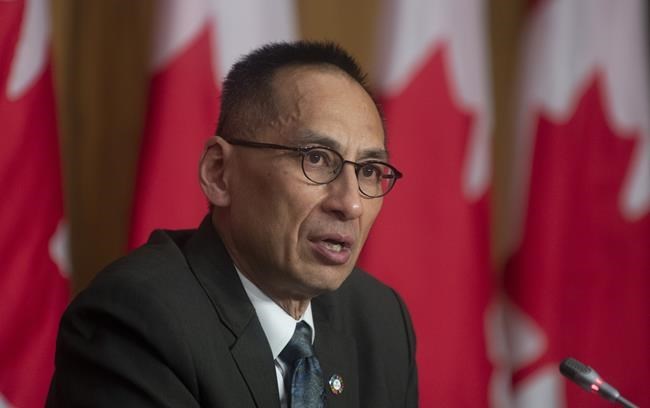OTTAWA — Federal and provincial health experts are looking at evidence that one shot of the Pfizer-BioNTech vaccine against COVID-19 might be almost as good as two, Canada's deputy chief public health officer said Thursday.
Dr. Howard Njoo said data presented by two Canadian doctors in the New England Journal of Medicine this week are compelling and raise legitimate questions about how best Canada should be allocating its scarce vaccine doses.
"These are what I would call early data in terms of a vaccine effectiveness or studies," he said. "And the indications are that there's a good level of protection after just one dose."
In a letter to the New England Journal of Medicine published Wednesday, Dr. Danuta Skowronski from the British Columbia Centre for Disease Control and Dr. Gaston De Serres from the Institut national de santé publique du Québec base their claim on documents submitted by Pfizer to the U.S. Food and Drug Administration.
The doctors argue if you measure the number of cases of COVID-19 reported by Pfizer and BioNTech two weeks after giving one dose, but before a second dose is given, those given the vaccine were 92 per cent less likely to contract COVID-19 than those in the group given a placebo.
Original data suggested one dose gave about 52 per cent protection and two doses gave 94.5 per cent protection, but the doctors say that was measured from the moment the vaccine was given, rather than waiting two weeks to let the immune system gear up.
"With such a highly protective first dose, the benefits derived from a scarce supply of vaccine could be maximized by deferring second doses until all priority group members are offered at least one dose," the doctors write.
They note that there is limited information on how long protection lasts after just one dose, but that they think giving the second dose so quickly is not beneficial in the short term and leaves highly vulnerable people without first doses "completely unprotected."
Pfizer has issued caution about adjusting the dosing schedule but said the decision to do so rests with local authorities.
"We at Pfizer believe that it is critical for health authorities to carry on surveillance on implemented alternative dosing schedules to ensure that vaccines provide the maximum possible protection," the company's statement reads.
Njoo said the doctors presented their findings to an advisory committee of federal and provincial public health officials, which is now having "very live and ongoing" discussions about it.
He also said early reports from provincial health authorities seem to be showing reduced evidence of COVID-19 in long-term care homes as most residents in Canada have now been given at least one dose.
"The results are encouraging," he said.
Canada has vaccinated more than 990,000 people with at least one dose so far and is aiming to vaccinate three million people with two full doses by the end of March. Reducing the Pfizer-BioNTech vaccine to one dose temporarily could quicken that pace.
Pfizer-BioNTech's vaccine is meant to be given in two doses, 21 days apart. In January, several countries delayed that second dose, and the second doses for other vaccines including AstraZeneca's and Moderna's, to try to get at least some protection to more people faster.
Canada's National Advisory Committee on Immunization said in January that the recommended schedule should be followed wherever possible but that delaying a second dose up to six weeks could be beneficial, particularly with a shortage of supplies and a fast-spreading virus.
Several provinces have been doing that, particularly as deliveries of both Pfizer-BioNTech's vaccine and Moderna's slowed to a crawl in mid-January.
Those delays appear to be over, at least for Pfizer, which shipped 403,650 doses to Canada this week and laid out a schedule to ship 475,000 next week and 444,000 every week in March.
This week's shipment was delayed slightly by winter weather in the United States, but all the doses are now in Canada, said Maj.-Gen. Dany Fortin, the military commander overseeing Health Canada's vaccine distribution.
Moderna currently delivers only every three weeks but said they are cutting that to two weeks next month.
Moderna's last shipment and the next will be smaller than expected but the company will ship 1.3 million across two separate shipments next month, said Fortin.
If those deliveries happen as promised, the companies will meet their contracts to deliver six million total doses by March 31.
With the two authorized vaccines, and the two-dose schedule followed, Canada expects to vaccinate 14.5 million people by the end of June and all Canadians who want to be immunized by the end of September.
A new vaccination schedule issued Thursday shows if the other three vaccines currently being reviewed get approved by Health Canada, 24.5 million Canadians could be vaccinated before Canada Day.
This report by The Canadian Press was first published Feb. 18, 2021.
Mia Rabson, The Canadian Press



